In a devastating overnight assault, Russia launched a barrage of drones and missiles across Ukraine, resulting in the deaths of five individuals and widespread damage to civilian infrastructure.
Ukrainian President Volodymyr Zelenskyy reported that the attack involved roughly 50 missiles and 500 combat drones targeting multiple regions.
“The offensive included cruise missiles, Shahed drones, and Kinzhals among other weapons,” Zelenskyy explained. “Areas such as Lviv, Ivano-Frankivsk, Zaporizhzhia, Chernihiv, Sumy, Kharkiv, Kherson, Odesa, and Kirovohrad were all hit.”
Tragically, one person lost their life in Zaporizhzhia, while four members of a family, including a 15-year-old girl, were killed in Lviv.
Andriy Sadovyi, mayor of Lviv, revealed that the city suffered power outages and disruptions to public transportation. He urged residents to remain indoors due to smoke and multiple active fires.
Mykola Dmytrotsa, a resident of the nearby village of Lapaivka, described the destruction to his home: “All the windows shattered, doors destroyed, and the roof damaged. It’s hard to put into words.”
Local official Volodymyr Hutnyk added, “Ten private houses in the area were so badly damaged they are uninhabitable and will need to be demolished and rebuilt. Numerous other homes have broken windows, damaged doors, and compromised roofs.”
Located close to the Polish border, Lviv had largely been spared from the most severe Russian strikes until now.
Maksym Kozytskyi, governor of the Lviv region, described this as the most intense attack the area has endured since the conflict began over three years ago.
Ukraine’s Prime Minister Yulia Svyrydenko condemned the strikes, stating, “Residential buildings and vital infrastructure were hit across all affected zones. Moscow continues to target homes, schools, and energy facilities, demonstrating that destruction remains its sole tactic.”
Parliament member Kira Rudik lamented, “The explosions that rocked Ukraine last night were preventable tragedies, all of which could have been avoided if Russia had been stopped.”
On Saturday, a Russian strike on a passenger train in Sumy killed at least 30 people, an attack Zelenskyy described as “brutal.”
Poland Deploys Fighter Jets
In response to the escalating threat, Poland activated its fighter jets alongside NATO allies to safeguard its airspace. The Polish air force characterized the deployment as “preventive,” aimed at protecting citizens and maintaining security.
Earlier in September, approximately 20 Russian drones breached Polish airspace, raising alarms about potential spillover effects of the conflict into NATO territories. Russia has also been accused of violating the airspace of other NATO countries, including Norway, Estonia, Lithuania, and Denmark.
Belgium reported spotting 15 drones over a military installation in its eastern region last Friday. Defence Minister Theo Francken noted no direct evidence linking Moscow but suggested these drones represent hybrid warfare tactics designed to destabilize and spread fear, a pattern consistent with Russian strategies over recent years.
Despite these accusations, Russia has denied involvement in many of the drone incursions. President Vladimir Putin dismissed claims that Russia was behind the recent drone attacks.
On Saturday, Denmark reported aggressive maneuvers by Russian naval vessels, including tracking Danish ships, sailing on collision courses, radar tracking of aircraft, and weapon targeting. Danish intelligence chief Thomas Ahrenkiel described these actions as “military pressure tactics that stop short of traditional armed conflict.”
The European Union’s foreign policy chief, Kaja Kallas, condemned Russia’s recent terror attacks on Ukrainian civilians and infrastructure, calling them a cover for Moscow’s failed summer offensive. Kallas affirmed the EU’s commitment to support Kyiv “for as long as necessary” and announced preparations for a new sanctions package.
Lithuanian Foreign Minister Kestutis Budrys echoed Zelenskyy’s call for a global halt to purchasing Russian energy, emphasizing that such resources fuel Moscow’s war efforts. “We must end the supply that feeds its imperial ambitions and state-sponsored terror,” Budrys stated on social media.
These developments come amid Europe’s increasingly firm stance against Russia, including new sanctions, proposals to redirect Russian funds to Ukraine, and increased NATO arms deliveries to Kyiv, even as the United States seeks cautious engagement with the Kremlin.
Samuel Ramani, a defense analyst at the UK’s Royal United Services Institute (RUSI), explained that Russia’s recent actions are a response to Europe’s staunchly pro-Ukraine position. “Russia views Europe as a relentless adversary, while still seeing potential for negotiation with the US,” Ramani said. “Consequently, Russia employs tactics such as GPS jamming, drone incursions, and even hot air balloons-as seen in Lithuania-to express its dissatisfaction.”

















